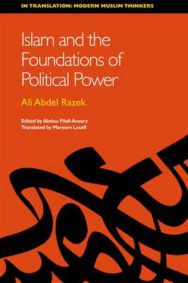
ABOUT THIS BOOK
PUBLISHER: Edinburgh University Press
FORMAT: Paperback
ISBN: 9780748689835
RRP: £19.99
PAGES: 144
PUBLICATION DATE:
September 30, 2013
BUY THIS BOOK
As an Amazon Associate and Bookshop.org affiliate we earn from qualifying purchases.
Islam and the Foundations of Political Power
Ali Abdel Razek
Abdou Filali-Ansary
Maryam Loutfi
This is the first English translation of this controversial essay that challenged fundamental ideas about political power. Egypt, 1925: the Muslim world is in turmoil over Mustapha Kamal Ataturk’s proposal to abolish the caliphate in Turkey. The debate over Islam and politics re-ignites as traditional political systems dissolve under pressure from European powers and most Muslim countries lose their sovereignty. Into this debate enters Ali Abdel Razek, a religious cleric trained at Al-Azhar University, arguing in favour of secularism in his essay ‘Islam and the Foundations of Political Power’, translated here and published in paperback for the first time. It includes a substantial introduction that places the essay in its context and explains its impact. It features an appendix of Razek’s sources with full publication details. It includes explanatory notes beside Razek’s original footnotes. There are additional notes about particular people, events or vocabulary that may be unfamiliar to modern readers.
Reviews of Islam and the Foundations of Political Power
'It is somewhat astonishing that Ali Abdel Raziq's Al-Islam Wa Usul Al-Hukm, one of the most discussed and most significant books of early twentieth-century Egyptian, Arab, and Islamic intellectual history, should have gone so long without a translation into English. Its appearance, in Edinburgh's 'In Translation: Modern Muslim Thinkers' series, is therefore especially welcome … Filali-Ansari's introduction situates the work in its own context, particularly stressing its importance in sparking what might be seen as the first major 'public-opinion' controversy of modern Middle Eastern history.' — James McDougall, Trinity College, Oxford, Journal of Islamic Studies
Ali Abdel Razek
Abdou Filali-Ansary is Director of the Aga Khan University Institute for the Study of Muslim Civilizations. Maryam Loutfi formally worked in the Ministry of Finance and Economy and is presently working in the area of Education.









